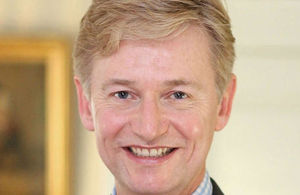"What did the UK’s G8 Presidency achieve?"
Article by British Ambassador to Morocco, Clive Alderton, published in Moroccan LE MATIN and Assahra al-Maghribiya on 19 January 2014

British Ambassador to Morocco, Clive Alderton
New Year celebrations always provide a prompt to look back on the previous year. 2013 was an important one for the UK, as our Presidency of the G8 group of large economies gave us an opportunity to make a difference on the international issues which are the very highest priorities for the British Government. I am particularly proud that, in several key areas, Morocco played a central role as a key partner for the UK’s Presidency.
The UK’s commitment to free trade and transparency was at the heart of the agenda for our G8 Presidency. At Lough Erne in Northern Ireland in June 2013, the G8 stressed its commitment to reducing protectionism and making progress on new Free Trade Deals. The launch of negotiations between the EU and Morocco on a new Free Trade Agreement was a great sign of what is possible in this area. G8 leaders also agreed on a number of steps aimed at boosting trade, combating tax evasion, and increasing transparency in order to benefit development. The G8 countries agreed to share more information with each other to combat tax evasion. We agreed that governments should provide information to their citizens in a transparent way and that companies working in extractive industries like mining should be open about what payments they make to governments.
The area in which we were able to work most closely with Morocco was through the Deauville partnership. This partnership sees the countries of the G8 working together with the countries of North Africa to support their democratic transitions. The year kicked off with a meeting in Rabat in February to allocate funding for projects to support political and economic reform across -North Africa. Under the UK Presidency, Morocco succeeded in securing $25m in funding from the Deauville partnership - more than any other country. These projects will help equip unemployed youth with business skills, provide access to finance for SMEs, and support citizen engagement through implementation of the Government’s New Governance Framework.
Morocco sent high-level delegations, both led by Ministers, to two conferences hosted by the UK under our Deauville Presidency. First, in June, a delegation of female Moroccan business leaders attended a Women in Business forum, which saw the hugely impressive Nezha Hayat win a prize for her outstanding contribution to financial and professional services. Later in the year, an investment conference in London gave Morocco the chance to promote its many investment opportunities to an international audience of investors. I hope that the excellent Moroccan participation in these two events will lead to ever greater business links between our two countries – we have much to offer each other.
In October 2013, the UK and Morocco co-hosted the second Arab Forum on Asset Recovery, aimed at assisting MENA countries in recovering the assets stolen by leaders of former regimes. Over 40 countries attended the forum to share information and expertise. This was a landmark example of the UK and Morocco working together in a practical way to offer support to the wider North Africa region.
We also used our G8 Presidency to focus the world’s attention on ending the tragedy of sexual violence in conflict. In partnership with actress and UN Special Envoy Angelina Jolie, the British Foreign Secretary William Hague launched the Preventing Sexual Violence Initiative aimed at ending the use of rape as a weapon of war, by treating it not as an inevitable consequence of conflict but as a crime that can be stopped. In April 2013 the UK led G8 Foreign Ministers in calling for urgent action to address the culture of impunity for wartime rape, and by September 2013 more than two thirds of the members of the United Nations – including Morocco – had signed up to a Declaration of Commitment to End Sexual Violence in Conflict. The UK is committed to continuing this international action in 2014 in order to eradicate this terrible crime in conflict.
The shadow of the conflict in Syria hung over the year 2013. The UK used its Presidency of the G8 to continue to push for a transition to a democratic and stable Syria and to urge greater global action to address the humanitarian situation in Syria itself and in refugee camps in neighbouring countries. The UK – through both government and members of the public – has now donated over £500m in humanitarian aid. This is our largest ever humanitarian contribution to a crisis, but the world will need to do more in 2014.
As we head into 2014, the Deauville and other G8 initiatives will continue under the Presidency of Russia. Looking back on 2013, I am delighted that so many of the UK’s G8 Presidency achievements involved, in one way or another, a high level of partnership with Morocco.
We can both be proud of what we achieved together.